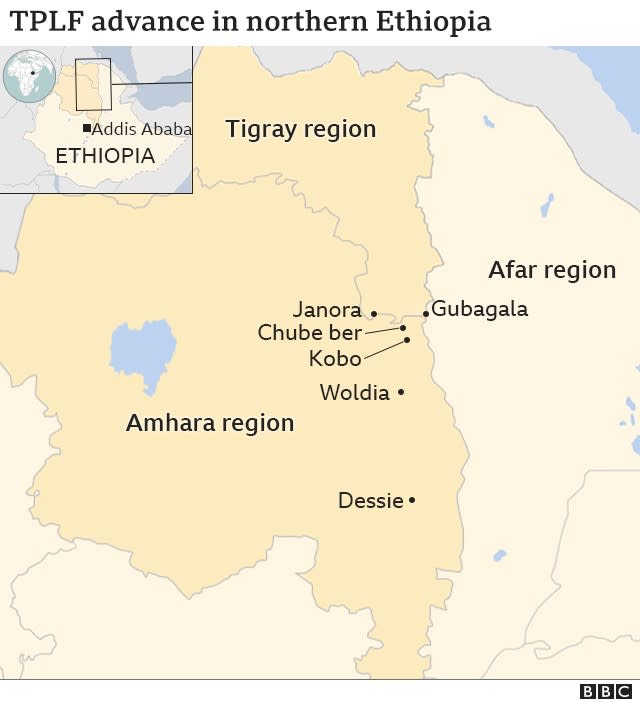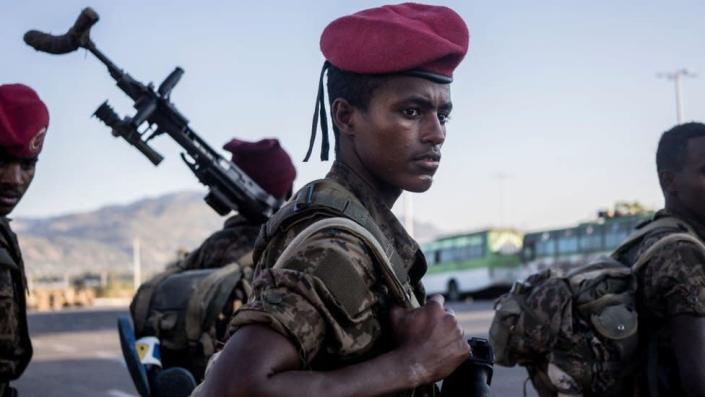
The war in Ethiopia, between the federal government and the Tigray People’s Liberation Front (TPLF), has resumed at full scale. The route back to negotiations is uncertain at best.
The two sides agree that the first shots were fired in the early morning of 24 August on the southern borders of Tigray, where it adjoins the neighbouring Amhara state at the town of Kobo. Each side blames the other for firing those shots.
What is clear – from information obtained from Western diplomats – is that the Ethiopian National Defence Force and its allied Amhara militia, known as the Fano, had mobilized a huge force to that location over prior weeks.
Meanwhile, mass conscription by the TPLF had swelled its ranks and it had devoted much of its resources to training and rearming, although it has denied forced recruitment.
It captured a huge arsenal from the federal army in last year’s fighting, and there are rumours that it had also bought new weapons from abroad.
Tensions were building. And yet, just a few weeks ago there was optimism that peace talks might soon be under way.
Prime Minister Abiy Ahmed had authorized his deputy, Demeke Mekonnen, to head a peace committee, which began work in July.
Even before that, Mr Abiy had reportedly sent senior officials to secretly meet the TPLF.
In sessions in the Seychelles and Djibouti, it appears that agreement was reached that Ethiopian forces would lift their blockade of Tigray, that Eritrea would withdraw the troops it had sent to support the government and that the two sides would open full talks in the Kenyan capital Nairobi, hosted by President Uhuru Kenyatta. The first agenda item would be a permanent ceasefire.
Behind the scenes, the US was strongly backing these talks and was working in partnership with Kenya.


Visiting the Tigrayan capital Mekelle on 2 August, US Special Envoy Mike Hammer and envoys of the European Union and United Nations called for “a swift restoration of electricity, telecom, banking, and other basic services”, and “unfettered humanitarian access”, hinting that Mr Abiy had agreed to do these things.
However, the African Union envoy, Olusegun Obasanjo, remained silent on the siege. Briefing the envoys, Gen Obasanjo insisted that he was the sole mediator and surprised them by proposing to invite Ethiopia’s ally, Eritrea, to the talks.
The TPLF accuses the government of reneging on its commitments. The government doesn’t admit that any meetings took place. International envoys are also staying silent on exactly why the talks broke down.
Throughout July and August, Addis Ababa largely kept the blockade of essential services in place, permitting only a trickle of food, medicine and fertilizers for this season’s crops.
The TPLF is unimpressed by international praise for a five-month “humanitarian truce”, which allowed the World Food Programme (WFP) to resume operations in Tigray, albeit on a limited scale.
It insists that Addis Ababa’s continued blockade amounts to using hunger as a weapon of war and that the aid operations were pitifully insufficient.
The WFP says it was reaching “tens of thousands” of people. That was a start, but far short of the 4.8 million in need.
In an open letter to international leaders on the eve of the fighting, TPLF leader Debretsion Gebremichael said: “We are fast approaching the point at which we face death which ever way we turn. Our choice is only whether we perish by starvation or whether we die fighting for our rights and our dignity.”
Mass starvation is decimating the Tigrayans. No-one knows how many have perished but an investigation by a Belgian-led academic team earlier this year estimated that as many as 500,000 Tigrayans had died of hunger and related causes since the war began in November 2020 following a massive fall-out between the TPLF-controlled regional government and Mr Abiy’s federal administration.
With the sole exception of a French TV crew from the channel ARTE, there’s been no foreign news correspondent in Tigray since the TPLF regained control of most of the region in June 2021.
The few aid workers permitted to enter have not been able to collect basic data on child deaths, with the WFP spokeswoman conceding that “we just don’t know”, whether there was a famine or not.
In the short term, the humanitarian disaster can only deepen. Those limited aid operations are now at a halt. The first meagre crops won’t be harvested for more than a month and fighting will cause further devastation.
The Ethiopian air force bombed Mekelle last week, hitting a kindergarten and killing seven, including three children, according to medical staff. The government denied the account and insisted it targeted military sites only. A second air strike was reported on Mekelle on Tuesday night.
The Tigrayans requisitioned 12 tankers of fuel from the UN, drawing irate condemnation from senior humanitarian officials.
The TPLF said they had loaned the UN fuel some months ago and were only reclaiming it, but the manner and timing of their act suggests it was not for delivering routine services, as their spokesman claimed.
The Ethiopian air force claimed to have shot down a plane bringing arms to Tigray from Sudanese airspace. The TPLF denied it.
There are reports of large troop movements in Eritrea – both Eritrean and Ethiopian – in positions close to the Tigray border. The Eritrean government has, characteristically, remained silent. On Wednesday, fighting was reported in western Tigray towards the border with Sudan.
Through the fog of war, the news filtering out is that the battle for Kobo was huge. Tigrayan sources report a decisive victory against a massive force of 20 divisions, in which an enormous arsenal was captured. There’s no independent confirmation of this.
The Ethiopian government denies that it has suffered losses. It has also instructed the media to “carefully manage their reporting and access to information in times of crisis in order to reflect the country’s national interest”.
It said it had evacuated Kobo, and reports from the city of Woldia, 50km (30 miles) to the south, indicate that the army is nowhere to be seen.
So far, the TPLF has not moved its forces south, saying that it has no intent of repeating last year’s advance that reached within 200 km of the capital. In fact its spokesman made a point of denying reports that it had captured Woldia.


The TPLF’s stated position is that it wants immediate peace talks. Although it has a formal coalition with the Oromo Liberation Army, fighting a fierce war against the federal government in the south and west of Ethiopia, the TPLF doesn’t have a coalition that could govern the country.
And the sentiment of most Tigrayans is that they should fight for their home region only.
As of now, there is no credible process. A year after his appointment, without any progress, some African and Western diplomats are quietly saying that Gen Obasanjo’s position is untenable although he retains the backing of Ethiopia’s government.
But the US-Kenya initiative faltered in mid-August when William Ruto was declared winner of the election in Kenya, defeating the candidate endorsed by Mr Kenyatta, Raila Odinga.
The plan had hinged on Mr Kenyatta’s personal involvement, and while it’s possible that Mr Ruto may nominate Mr Kenyatta to head peace talks, there’s a lot of uncertainty in Kenyan politics before that could happen.
The Americans appear to have had no “plan B”.
Secretary of State Antony Blinken has called for a return to talks “without any preconditions”. It’s unlikely that either side will heed his words.
Mr Abiy won’t want to seem weak by negotiating in the wake of battlefield losses. Addis Ababa has reverted to language that condemns the TPLF as “terrorists”.
The TPLF demands lifting the siege – which they call a war crime – as a precondition for any talks.
It insists that the federal government should not be given carte blanche to renege on commitments already made.
The suffering and death of the last week has so far only proven something that Ethiopians and the international community should already have known – there’s no military solution to the war in Tigray.


Alex de Waal is the executive director of the World Peace Foundation at the Fletcher School of Law and Diplomacy at Tufts University in the US.




